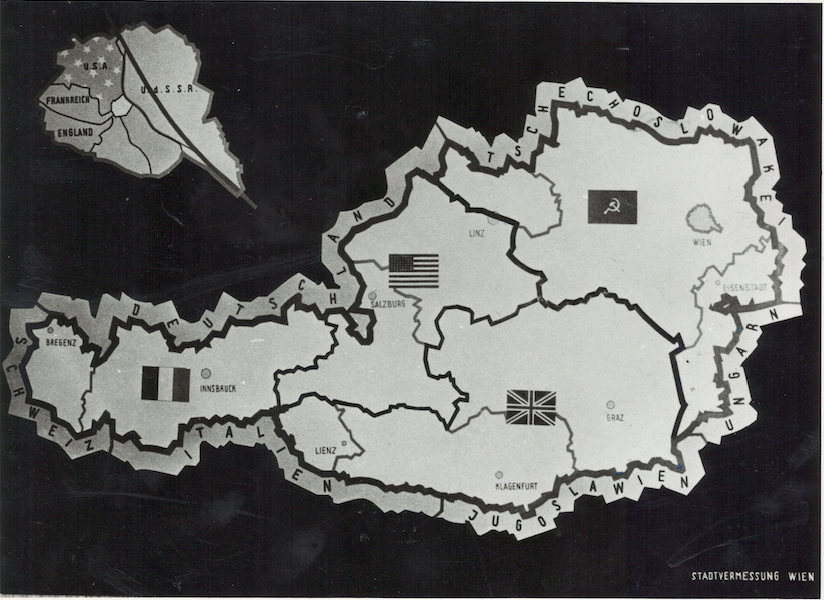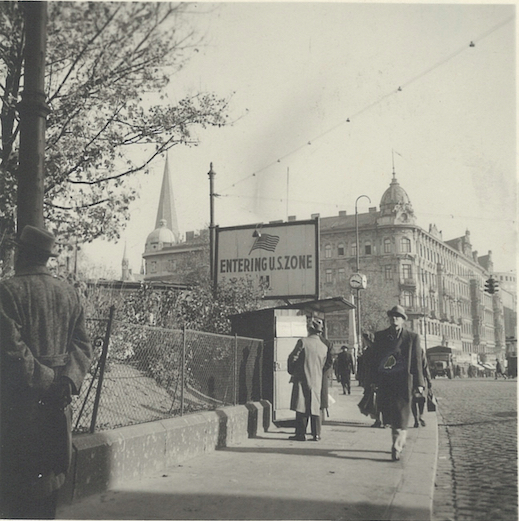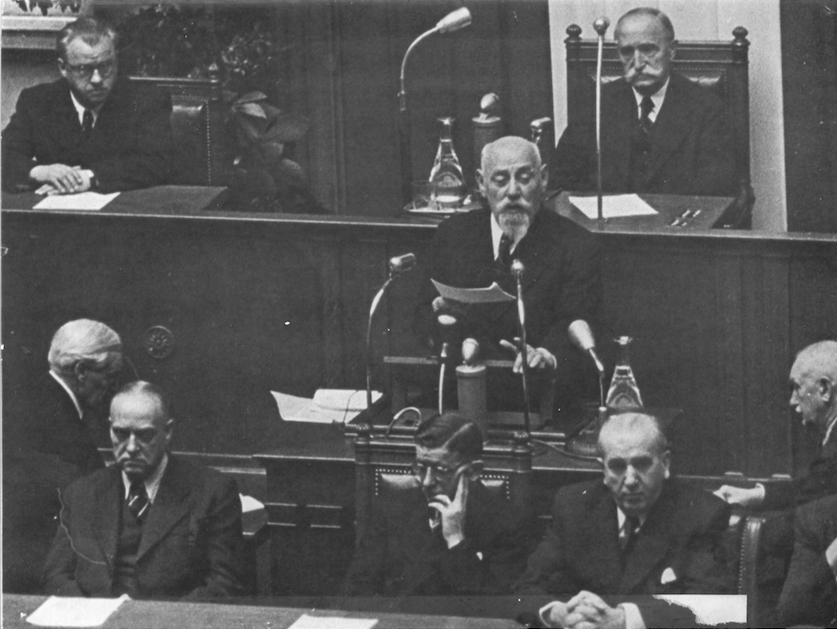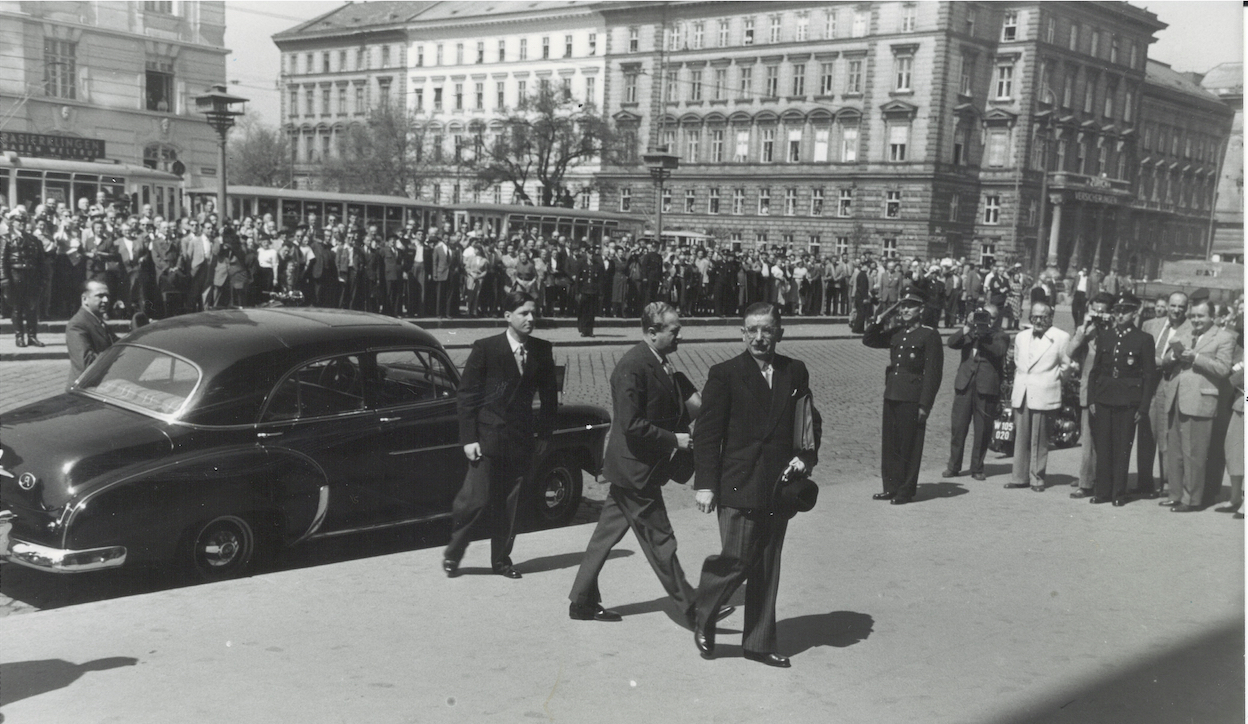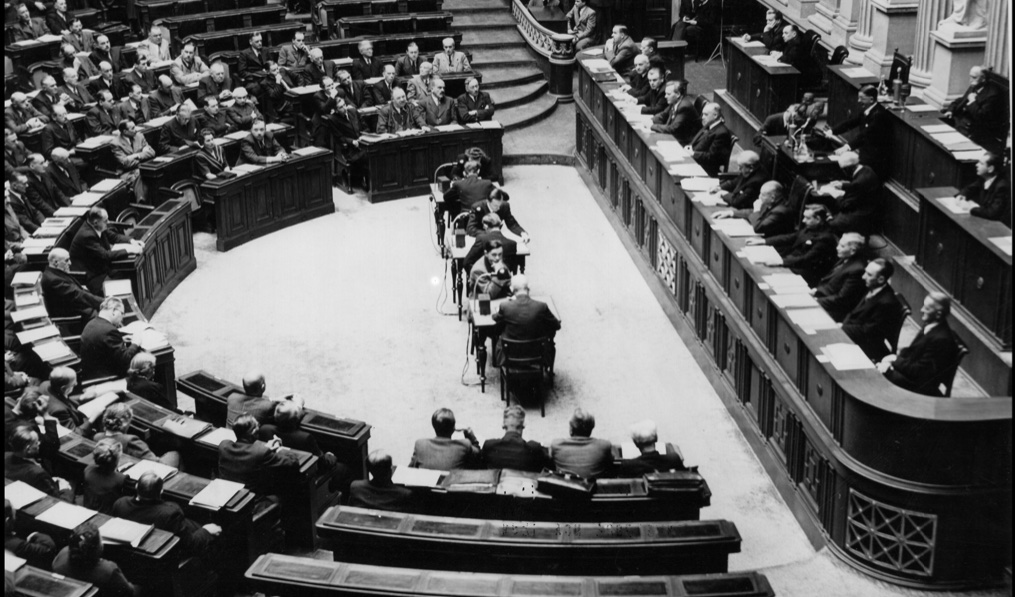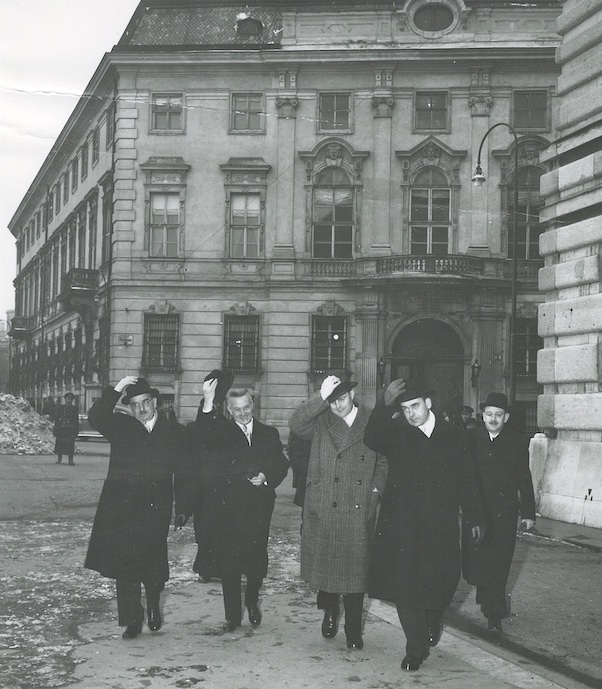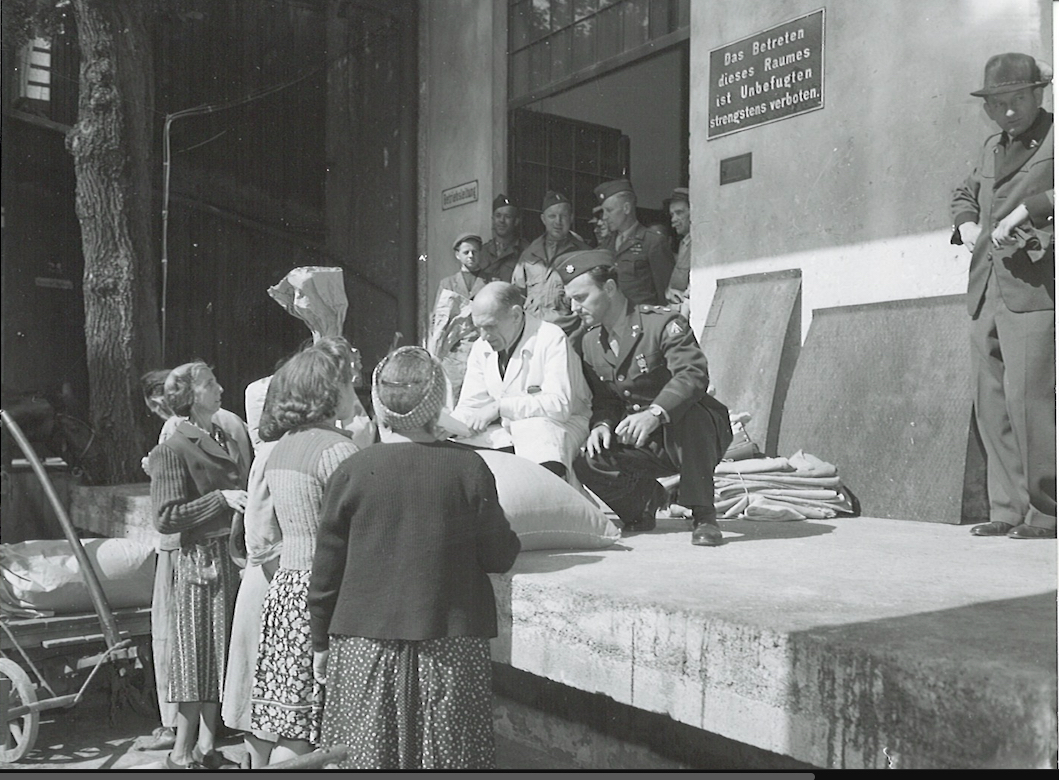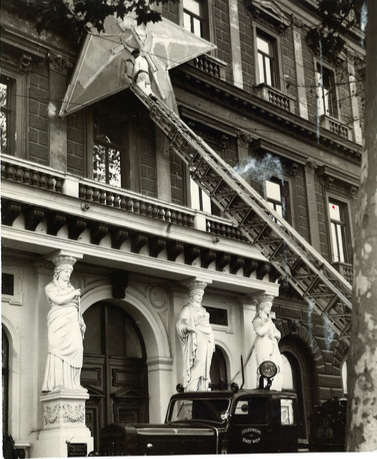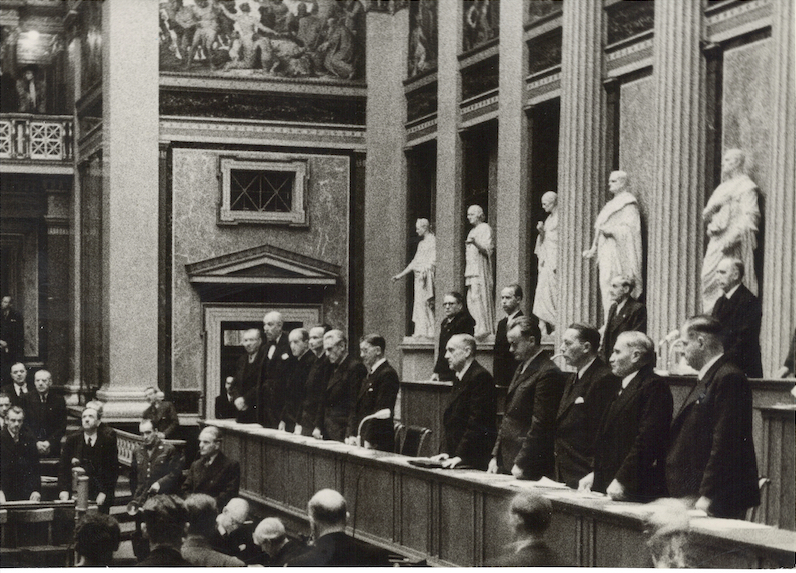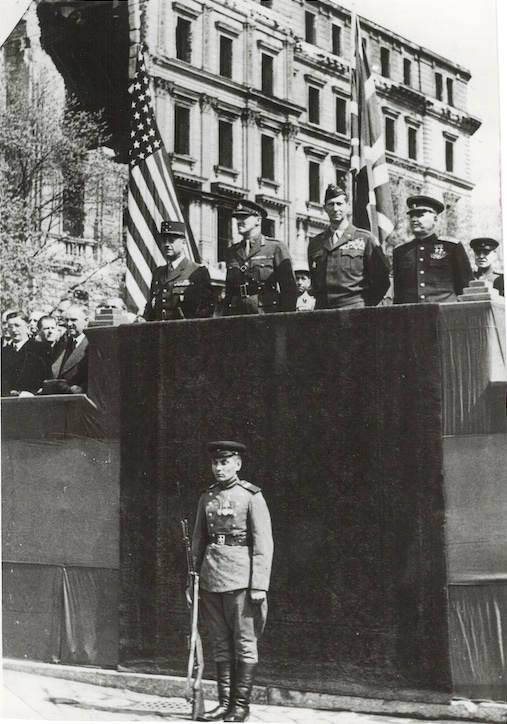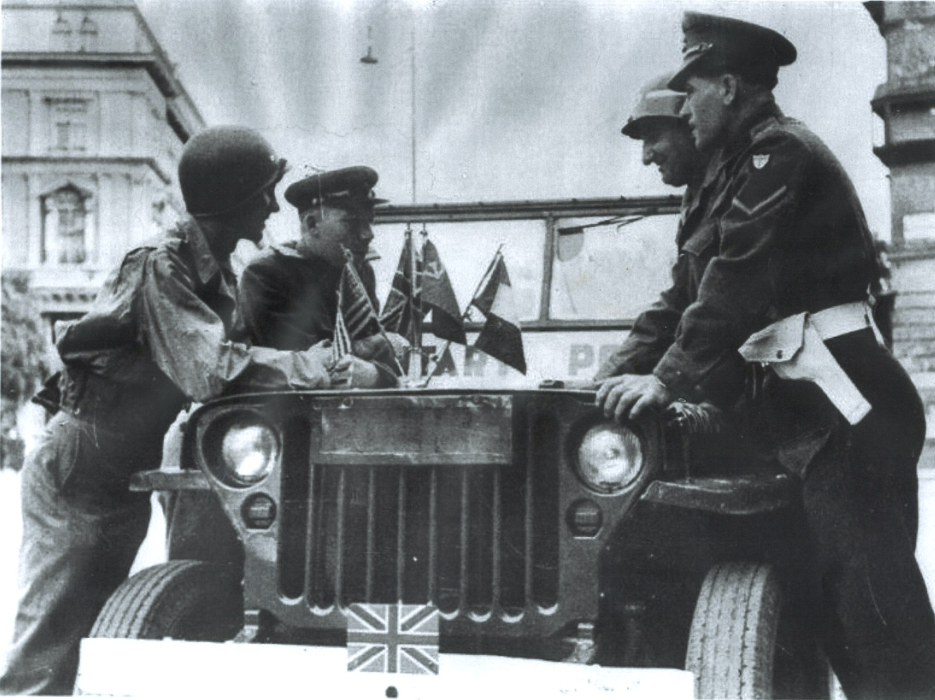In Österreich, wo das politische Leben ein Jahrzehnt lang von den vier Besatzungsmächten wesentlich mitbestimmt wurde waren in den ersten Jahren der Zweiten Republik Innen- und Außenpolitik kaum voneinander zu trennen und dies sollte auch bis 1955 so bleiben.
In der Sitzung des Parteivorstandes der SPÖ vom 13. September 1945 (Dokument 1) gab Staatskanzler Renner ein Bild der Situation Österreichs im Herbst 1945, wie es sich aus seiner Sicht darstellte. Dabei erwähnte er die Nichtanerkennung der Regierung durch die westlichen Alliierten genauso wie die bevorstehende Länderkonferenz und die Notwendigkeit möglichst baldiger Wahlen. Bemerkenswert ist die Einschätzung, wonach die Alliierten sich bald aus Österreich zurückziehen würden sowie die Einschätzung der ÖVP als Hauptgegner bei den Wahlen, während ein möglicher Zugewinn der KPÖ nicht gefährlich wäre. Vielmehr würde eine Mehrheit von SPÖ und KPÖ die Regierungsfähigkeit sicherstellen. In der Folge warfen bereits die Probleme, die sich aus den Potsdamer Beschlüssen im Zusammenhang mit dem sogenannten Deutschen Eigentum ergaben, ihre Schatten voraus.
Ein Jahr später hatten die Verhandlungen um einen Vertrag für Österreich noch nicht einmal begonnen. Im April 1946 hatte es die Sowjetunion abgelehnt, die Behandlung der österreichfrage auf die Tagesordnung des Rates der Außenminister zu setzen, sodass im Sommer 1946 mit dem Zweiten Kontrollabkommen ein neuer modus vivendi im Verhältnis zwischen Österreich und den Alliierten gefunden werden musste. Dazu kam auch die Enttäuschung in Bezug auf Südtirol. Vor diesem Hintergrund gab Außenminister Gruber am 10. Oktober 1946 vor dem Außenpolitischen Ausschuss und der sozialistischen Ausschussfraktion eine tour d'horizon über die aktuellen Fragen der österreichischen Außenpolitik und eine Einschätzung der Haltung der Alliierten (Dokument 2).
Ein für die Entwicklung des Verhältnisses zur Sowjetunion interessantes Dokument ist das Protokoll der Sitzung des Parteivorstandes der SPÖ vom 15. Oktober 1946 (Dokument 3), in dem
über die Rückkehr Karl Waldbrunners von seinem Gesandtschaftsposten nach Wien entschieden wurde.
Karl Waldbrunner war innerhalb der SPÖ „ein Mann der Ersten Stunde“: Schon im April 45 gehörte er der Provisorischen Staatsregierung Renner an und spielte von Anfang an eine führende Rolle innerhalb der SPÖ. Als im Jänner 1946 die Alliierten der Entsendung österreichischer diplomatischer Vertreter nach Washington, Moskau, Paris und London zustimmten, wurde für die Gesandtschaft in Moskau über ausdrücklichen Wunsch Bundespräsident Renners Karl Waldbrunner, der sich vor 1937 einige Jahre in der UdSSR aufgehalten hatte und über perfekte Russischkenntnisse verfügte, ausgewählt. Von seinen politischen Funktionen war Waldbrunner von Anfang an nur berurlaubt, offenbar wurde seine
diplomatische angesehen. Tätigkeit parteiintern nicht als Dauerlösung
Das vorliegende Sitzungsprotokoll macht deutlich, weshalb Waldbrunner bereits nach wenigen Monaten wieder nach Wien zurückkehrte. Für Vizekanzler Schärf mußte die „Mission Waldbrunner als gescheitert betrachtet werden“. Er konzedierte, dass man die Wertigkeit der Position überschätzt habe, die auf Grund der russischen Haltung („Die Russen haben ihn auf dem Trockenen sitzen lassen“) für die SPÖ „keine Einflußposition“ sei. Renner habe den Plan erwogen, „einen anderen Mann hinauszusenden, der in der Partei einen noch höheren Rang bekleidet als Waldbrunner“, doch zeigte sich Schärf diesbezüglich skeptisch. Waldbrunner selbst beklagte sich über die mangelnde Bereitschaft des Koalitionspartners, eine Annäherung an die UdSSR wirklich zu betreiben, schränkte aber ein, dass man auch sowjetischerseits nicht gesonnen sei, die österreichische Frage in absehbarer Zeit zu regeln. In der sich daran anschließenden Diskussion zeigte sich zweierlei deutlich: zum einen, dass die SPÖ Waldbrunner dringend als Koordinator der Wirtschafts- und Verstaatlichungspolitik benötigte. Tatsächlich wurde Waldbrunner bereits im November 1946 einer der drei Zentralsekretäre der SPÖ. Andererseits herrschte eine fast übereinstimmende Meinung, nicht nochmals einen Parteipolitiker, sondern vielmehr einen der SPÖ zugehörigen Diplomaten nach Moskau zu entsenden, wobei in diesem Zusammenhang bereits mehrmals der Name Norbert Bischoffs fiel. Dieser ging dann tatsächlich nach Moskau, wo er bis 1959 blieb. Seine Entsendung sollte sich als gute Wahl erweisen.
Am 11. Dezember 1946 wurde von den Alliierten in Vorbereitung der für 10. März 1947 fixierten Außenministerkonferenz in Moskau eine Konferenz der Sonderbeauftragten für die deutsche und die österreichischen Fragen für 14. Jänner 1947 in London beschlossen. Damit war der Beginn der Staatsvertragsverhandlungen festgelegt. Von Anfang an schaltete sich Bundespräsident Renner aktiv in die Vorbereitungen der Verhandlungen ein, durchaus im Bewusstsein, damit in die Kompetenzen des Bundeskanzlers einzugreifen.2 Er rechtfertigte diesen Schritt im vorliegenden an Figl gerichteten Schreiben vom 27. Dezember 1946 (Dokument 4) mit seiner Rolle bei der österreichischen Verhandlungsdelegation in St. Germain, wobei er wie damals für die Zusammenstellung einer möglichst großen Delegation unter Einbeziehung von Ländervertretern, Repräsentanten der politischen Parteien und Wirtschaftsexperten plädierte. In seiner Antwort reagierte Figl wenig überraschend sehr zurückhaltend. Einerseits betonte er, dass von Regierungsseite bereits alle notwendigen Vorkehrungen getroffen worden seien, andererseits bekundete er gegenüber dem Staatsoberhaupt seine Bereitschaft, dessen Vorschläge im persönlichen Gespräch entgegenzunehmen und allenfalls in die Regierungslinie einzuarbeiten.
Im Rahmen der Konferenz der Sonderbeauftragten, die zwischen 14. Jänner und 25. Februar 1947 in London tagte, hatte die österreichische Delegation Ende Jänner die Möglichkeit, ihren Standpunkt zu präsentieren. Am 29. Jänner wurde den Alliierten ein Memorandum der Bundesregierung übermittelt, dass Bundeskanzler Figl und Außenminister Gruber einen Tag später erläuterten. Am 31. Jänner musste sich die österreichische Delegation, in deren Namen bei dieser Gelegenheit Außenminister Gruber sprach, den Fragen der Alliierten stellen, wobei das Gespräch bestimmt war von den gezielten und hartnäckigen Fragen des Botschafters der UdSSR Gusev. Das vorliegende von österreichischer Seite angefertigte Gedächtnisprotokoll (Dokument 5) stimmt inhaltlich mit den wissenschaftlich aufgearbeiteten Sitzungsberichten bereits überein.
In der Frage der die Mitschuld Österreichs betreffenden Passagen der Moskauer Deklaration differenzierte Gruber aus der damaligen österreichischen Verhandlungsposition recht geschickt—zwischen Österreich und den Österreichern und versuchte im Zusammenhang mit der Verantwortungsklausel den österreichischen Beitrag zu seiner Befreiung vom Nationalsozialismus in Gegenrechnung zu stellen. In diesem Sinne erkannte er die Moskauer Deklaration als Ausgangspunkt für die Verhandlungen mit Österreich vollinhaltlich an. Daneben befragte Gusev Gruber bezüglich der Anerkennung der Potsdamer Beschlüsse über das Deutsche Eigentum durch Österreich. Gruber bejahte dies, fügte aber hinzu, dass die österreichische Regierung nie offiziell von den Potsdamer Beschlüssen in Kenntnis gesetzt worden sei.
Der Hintergrund in dieser Angelegenheit war folgender: Im Zuge der Potsdamer Konferenz hatten sich die Alliierten als Reparationsleistung die deutschen Vermögenswerte in Österreich, das sogenannte Deutsche Eigentum, zugesprochen. Mitte 1946 hatte die UdSSR mit dem berüchtigten Befehl Nr. 17 unter extensivster Auslegung des Begriffes „Deutsches Eigentum“ in ihrer Besatzungszone die wichtigsten Wirtschafts-, Industrie- und Landwirtschaftsbetriebe, darunter die gesamte zum sowjetischem Eigentum erklärten Erdölindustrie unter sowjetische Kontrolle gestellt. Daran konnte auch das Zweite Verstaatlichungsgesetz vom 26. Juli 1946 nichts mehr ändern.
Auch bei der Außenministerkonferenz im April 1947 sorgte die Frage des Deutschen Eigentums in Österreich für Auseinandersetzungen, gab es doch keine Kriterien, nach denen das Deutsche Eigentum exakt zu definieren gewesen wäre. Lösung gab es dabei keine, so setzte man am letzten Tag der Außenministerkonferenz, dem 24. April, eine Expertenkommission, die vom 12.5. bis zum 11.10. 1947 tagende „Wiener Vertragskommission“ ein. Auf diese bezog sich auch Waldbrunner in seinem an Bruno Kreisky gerichteten Brief vom 17.Juni 1947 (Dokument 6), in dem er sich von der zu erwartenden Ergebnislosigkeit der Arbeit der Kommission überzeugt zeigte.4 Tatsächlich wurden in insgesamt 85 Sitzungen bis zum Oktober 1947 hauptsächlich Verfahrens- und prinzipielle Fragen behandelt. Erst in einer der letzten Zusammenkünfte legte dann der französische Außenminister Paul Cherriere den nach ihm benannten Cherriere-Plan vor. Dieser gliederte das Deutsche Eigentum in zwei Teile: Jene Ansprüche, die an Ort und Stelle den Alliierten zugesprochen werden sollten sowie jene Ansprüche, deren Gesamtwert festzustellen und in Zahlungs- bzw. Lieferansprüche umzuwandeln gewesen wäre. Dies hätte freilich bedeutet, dass die starke wirtschaftliche Position der UdSSR im Osten Österreichs bestehen geblieben wäre.
Eine innerstaatliche Analyse, die zwei Tage vor dem Bekanntwerden des französischen Plans erstellt wurde (Dokument 7), sieht den „Erfolg“ der Detailfragen Illusionen, Vertragskommission neben darin, „dazu beizutragen, dass auf rechtlicher Seite der Klarstellung von etwa noch vorhandene Forderungen der Sowjetunion bekämpft werden können, zu zerstören.“ Interessant sind die Schlussfolgerungen: Österreichischerseits ging man nach wie vor von einer prinzipiellen Bereitschaft der Sowjets aus, den Staatsvertrag abzuschließen, wenngleich man sich der drückenden wirtschaftlichen Bedingungen voll bewusst war. Dennoch wurden im vorliegenden Dokument die Vorteile eines Vertragsabschlusses höher bewertet. Dabei ist von der Gefahr der Zunahme der zentrifugalen Kräfte innerhalb Österreichs genauso wie von einer möglichen „Sowjetisierung“ der Ostzone, vergleichbar mit dem Osten Deutschlands, warnend die Rede.
Zwischen 27. November und 17. Dezember 1947 fand eine weitere Verhandlungsrunde der Sonderbeauftragten über den Staatsvertrag in London statt (57.- 63. Sitzung). Die bisherigen Vorschläge wurden zwar diskutiert, in der Frage des Deutschen Eigentums gab es aber weiterhin keine Einigung. In dieser Situation trat der stellvertretende Landesobmann des ÖAAB-Niederösterreich Hochleitner mit dem Vorschlag an Staatssekretär Graf heran, gemeinsam mit der SPÖ den Versuch zu unternehmen, mit einer Serie von Großkundgebungen in ganz Österreich öffentlichen Druck auf die Verhandler in London auszuüben (Dokument 8).
Rund zwei Jahre später waren es die äußeren Rahmenbedingen, die Mitte 1949 eine grundlegend veränderte und den Staatsvertragsabschluss als durchaus realistisch erscheinende Situation schufen. Im Zuge der Konferenz des Außenministerrates in Paris im Juni 1949 zog die Sowjetunion die Unterstützung jeglicher jugoslawischer Gebietsforderungen zurück und auch in der Frage des Deutschen Eigentums gelangten die vier Außenminister auf Basis des modifizierten Cherriere-Planes zu einer Einigung. Bis 1.September sollten die Sonderbeauftragten die Details aushandeln und den Vertrag unterzeichnungsreif machen.
Doch gerade bei diesen Details ergaben sich neue Probleme, auf die auch Gruber in seinem an Figl gerichteten Schreiben vom 25.August 1949 (Dokument 9) eingeht. Dabei wird die als Ergebnis des sich verschärfenden Ost-West Gegensatzes härter werdende amerikanische Haltung6 deutlich, sodass Gruber den Kanzler hier um einschlägige Interventionen ersucht. Demgegenüber vertraten die Briten eher die österreichische Position, wonach es besser sei, selbst unterdrückenden Bedingungen zu einem Vertragsabschluss zu kommen. In seinem Schreiben rechnet Gruber bereits mit einer Verzögerung der Fertigstellung des Vertrages bis Jahresende, der nicht allzu große Bedeutung zukäme, „wenn wir die Sicherheit hätten, dass sich nicht bis dorthin stärkere Kräfte für eine geltend machen dass nach dem weitere würden.“
Verschleppung des Vertragsabschlusses Handschriftlich fügte er noch hinzu,
1. September, dem Tag der britischen Unterhauswahlen, eher mit einer Erledigung zu rechnen sei, wobei die Chance auf eine Haltungsänderung der Amerikaner gering sei. In jedem Fall wäre es aber „besser, ihre Verantwortung festzunageln.“
Neben der Frage des Deutschen Eigentums, die dann schließlich aus dem Weg geräumt werden konnte, erklärte man sowjetischerseits im Herbst 1949 einen weiteren Punkt des Staatsvertragsentwurfes für unannehmbar: die österreichische Entschädigungspflicht an westliche Ölgesellschaften für Werte, die nach sowjetischer Auffassung als Deutsches Eigentum der UdSSR zustanden. Dieser Art. 42, Abs. 9 sah vor, dass Österreich auf Wunsch der Westmächte verpflichtet werden sollte, an die Ölgesellschaften Entschädigung für Werte zu zahlen, die nach westlicher Auffassung alliiertes, nach sowjetischer Auffassung jedoch deutsches Eigentum waren. Um dieses Hindernis zu überwinden, strebten die Westmächte eine bilaterale Vereinbarung mit Österreich an, die ihre diesbezüglichen Rechte sicherstellen sollte. Das Schreiben Grubers an Schärf vom 25. November 1949 (Dokument 10) steht im Zusammenhang mit diesem Vertrag: Gegenüber dem britischen Geschäftsträger Cheetham habe Minister Waldbrunner erklärt, dass das Parlament dieses Abkommen nicht ratifizieren werde. Da das Abkommen mit Zustimmung beider Parteien bereits den Ministerrat passiert hatte, ersucht nun Gruber Schärf um Klärung dieser Angelegenheit in seiner Partei. Tatsächlich ging das Abkommen über die Bühne und die Westmächte verzichteten am 2. Dezember 1949 auf ihren Vorschlag zu Art. 42, Abs.9.
Nachdem sich die hochgeschraubten Hoffnungen des Jahres 1949, zu einem Staatsvertragsabschluss zu kommen, nicht erfüllt hatten, erreichte in den Jahren 1950-1952 unter dem Eindruck der kommunistischen Machtergreifung in der Tschechoslowakei, der innerösterreichischen Ereignisse rund um den kommunistischen Generalstreikversuch 1950 und der sich verschärfenden weltpolitischen Spannungen nach Ausbruch des Korea-Krieges die Westorientierung Österreichs ihren Höhepunkt. Ihren sichtbaren Ausdruck fand diese in dem mit westalliierter Hilfe erfolgten Ausbau der österreichischen Sicherheitskräfte. Die seit 1949 bestehenden Gendarmerie-Alarmformationen entsprachen nämlich weder den österreichischen Bedürfnissen noch den amerikanischen Vorstellungen von einer Streitmacht, mit deren Hilfe Österreich im Falle eines Staatsvertragsabschlusses in drei Monaten verteidigungsfähig gemacht werden könnte.
Um die Aufstellung zusätzlicher österreichischer bewaffneter Kräfte ging es auch in der Besprechung der österreichischen Regierungsspitze mit dem amerikanischen Botschafter Donnelly am 2. Oktober 1951 (Dokument 11). Dabei kam einerseits das bereits seit längerem laufende Projekt der Schaffung mobiler Gendarmerieeinheiten von je 500 Mann in den westlichen Besatzungszonen zur Sprache, andererseits und vor allem ging es aber um die Aufstellung jener 5000 Mann starken außerordentlichen Gendarmerietruppe, aus der in der Folge die sogenannte „B-Gendarmerie“ werden
sollte. Seitens der Amerikaner drängte man vehement auf den Aufbau der Einheit und war—wie auch in dem Gespräch deutlich wird—bereit, sowohl für die Ausrüstung zu sorgen als auch die finanziellen Lasten, die mit der raschen Aufstellung der Einheit in Zusammenhang standen, zu tragen. Bei diesem einer Einigung über eine Verbindungsstelle in Gespräch kam es zu Wien mit dem in Salzburg befindlichen Kommando der Einheit, die aus vier Personen bestehen und eine Koordinierungsfunktion wahrnehmen sollte. In der Folge wurde dieses Expertengremium, das aus den der ÖVP zuzurechnenden Fachleuten Emil Liebitzky und Theodor Iglseder sowie den SPÖ-nahen Hans Linsbauer und Ferdinand Linhart bestand, als „Wiener Komitee“ bezeichnet. In weiterer Folge wurde Anfang Mai ein definitives Abkommen mit den USA bezüglich Bewaffnung, Ausbildung, Unterbringung und Aufbringung der Kosten abgeschlossen. Ab 1. August 1952 begann die B-Gendarmerie zu existieren.
Am 12. November 1953 endete die achtjährige Karriere Karl Grubers als Außenminister mit der Bekanntgabe seines Rücktritts. Unmittelbarer Auslöser der Demission war die Veröffentlichung eines Buches Karl Grubers mit dem Titel „Zwischen Befreiung und Freiheit. Der Sonderfall Österreich“, in dem Gruber auf seine bisherige Tätigkeit als Außenminister einging. Die in der Zeitung „Die Presse“ als Sensation aufgemachte Publikation jener Passagen, in denen Gruber die sogenannte „Figl-Fischerei“ des Jahres 1947 nochmals beschrieb, rief heftige Unruhe und Kritik am Außenminister hervor. Für Kanzler Raab bot die Affäre die nicht unwillkommene Gelegenheit, den bei den Sowjets als Mann des Westens nicht besonders geschätzten Gruber abzuberufen. Am Tag seines Rücktritts, aber offenbar noch vor Bekanntgabe desselben, suchte Gruber Vizekanzler Schärf auf (Dokument 12). Gruber ersuchte dabei Schärf, einer allfälligen Entsendung seiner Person auf einen Botschafterposten - Schärf war offenbar klar, dass es dabei um Washington ging - im nächsten Frühjahr zuzustimmen. Einige Tage später stattete der neue Außenminister Figl Schärf seinen Antrittsbesuch ab (Dokument 13). Dabei betonte Figl, dass Raab Gruber schon seit längerer Zeit ablösen wollte, umgekehrt räumte er allerdings ein, dass sich Gruber ihm gegenüber stets loyal verhalten habe.
Literatur
Audrey Kurth Cronin. „Eine verpaßte Chance? Die Großmächte und die Verhandlungen über den Staatsvertrag im Jahre 1949.“ In Bischoff/Leidenfrost: Die bevormundete Nation: 347-370.
Stefan Karner und Barbara Stelzl-Marx (Hrsg.). Die Rote Armee in Österreich. Sowjetische Besatzung 1945–1955. (1. Band: Beiträge; 2. Band: Dokumente). Graz – Wien – München 2005.
Oliver Rathkolb.“ Von der Besatzung zur Neutralität. Österreich in den außenpolitischen Strategien des Nationalen Sicherheitsrates unter Truman und Eisenhower.“ In: Günter Bischof/Josef Leidenfrost (Hrsg.), Die bevormundete Nation. Österreich und die Alliierten 1945-1949 (=Innsbrucker Forschungen zur Zeitgeschichte, Bd. 4). Innsbruck 1988: 371-405.
Manfried Rauchensteiner. Die Zwei. Die Große Koalition in Österreich 1945-1966. Wien 1987.
Manfried Rauchensteiner, Der Sonderfall. Die Besatzungszeit in Österreich 1945 bis 1955. 2. Aufl. Wien 1985.
Gerald Stourzh: Geschichte des Staatsvertrages 1945-1955. Österreichs weg zur Neutralität. 3. Aufl. Wien 1985.
Michael Gehler: “’this nine days wonder’? Die „Figl-Fischerei von 1947. Eine politische Affäre mit Nachspiel.“ In: Michael Gehler/Hubert Sickinger: Politische Affären und Skandaleinösterreich. Von Mayerling bis Waldheim. Wien – München 1995.
